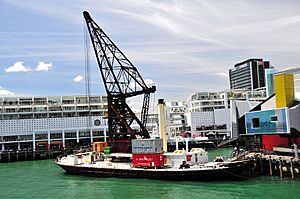Rapaki steam crane facts for kids

Rapaki in Auckland Harbour
|
|
Quick facts for kids History |
|
|---|---|
| Name | Rapaki |
| Owner | Lyttleton Harbour Board |
| Builder | Fleming & Ferguson, Paisley, Scotland |
| Yard number | 485 |
| Launched | 19 November 1925 |
| Identification |
|
| Fate | Towed for scrapping in December 2018 |
| General characteristics | |
| Tonnage | 762 GRT |
| Length | 160.4 ft (48.9 m) |
| Beam | 52.3 ft (15.9 m) |
| Installed power | steam engines |
| Propulsion | twin screw |
The Rapaki steam crane was a special ship in New Zealand's history. It was a large floating crane that helped move heavy things in the harbor.
Contents
What Was the Rapaki?
The Rapaki was a powerful steam-powered crane that floated on water. It was ordered by the Lyttelton Harbour Board in New Zealand. This board manages the port of Lyttelton.
Building the Rapaki
The Rapaki was built in Scotland by a company called Fleming & Ferguson. It cost about £42,000, which was a lot of money back then. The ship was launched in November 1925.
The Rapaki then sailed all the way from Greenock, Scotland, to Lyttelton, New Zealand. This long journey took 109 days! It finally arrived in Lyttelton on July 28, 1926.
Its Name and Special Features
The crane was named Rapaki after a small town near Lyttelton. It was a very strong crane, able to lift 80 tons. This made it very useful for moving large items like parts of ships or heavy cargo.
The Rapaki was one of only two steam cranes like it in New Zealand. The other one was called the Hikitia, which you can still visit today at the Wellington Waterfront.
Rapaki's Working Life
The Rapaki worked in Lyttelton Harbour for 60 years. It helped the port operate smoothly by lifting and moving heavy objects.
Helping During World War 2
During World War 2, the Rapaki was needed for war efforts. It was used for important work in the Pacific Ocean. This shows how valuable and strong the crane was.
End of Its Journey
After many years of hard work, the Rapaki was no longer needed in Lyttelton. It was moved to Auckland and became an exhibit at the Maritime Museum. People could visit it and learn about its history.
However, in December 2018, the Rapaki was taken to Wynyard Wharf to be taken apart. Some of its useful parts were given to the Hikitia crane, so a piece of Rapaki lives on.
See also
- List of classic vessels
- List of museum ships
 | Audre Lorde |
 | John Berry Meachum |
 | Ferdinand Lee Barnett |

